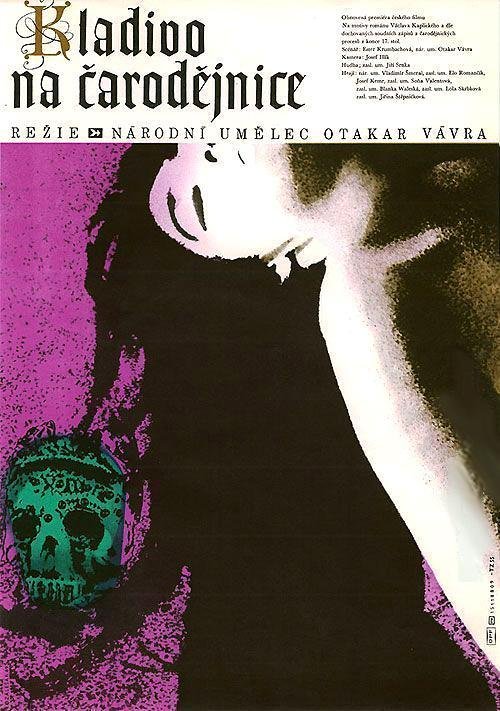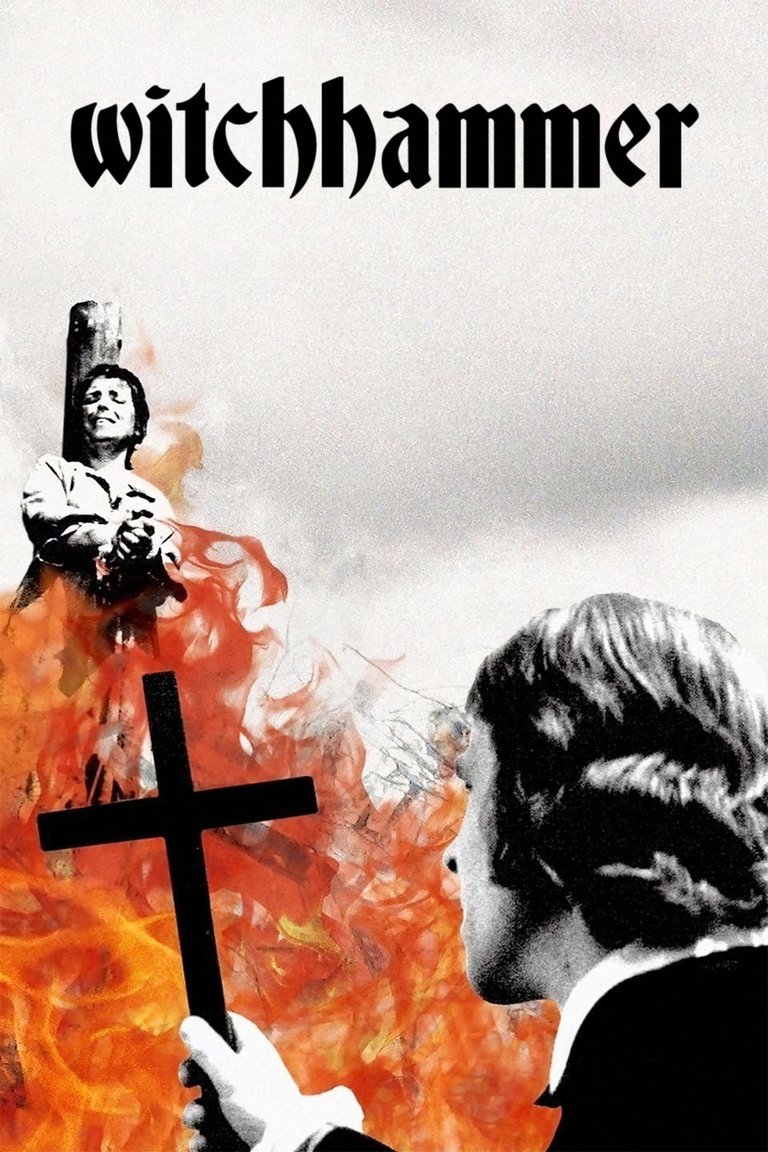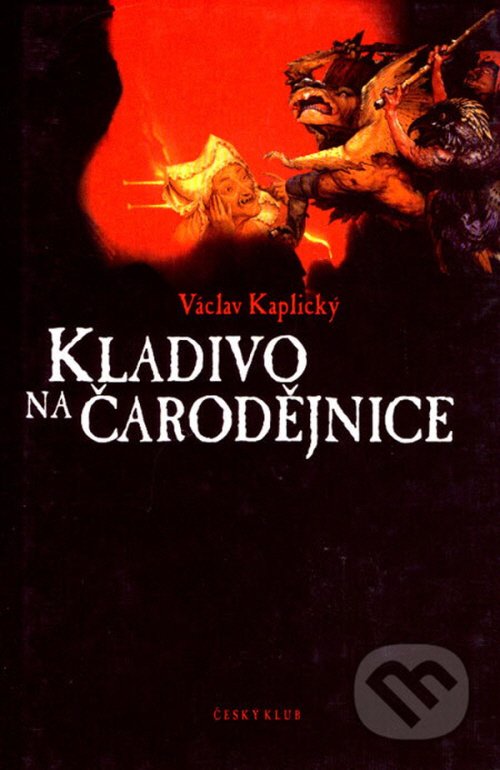Witchhammer (1970): who's the monster? | ¿quién es el monstruo?
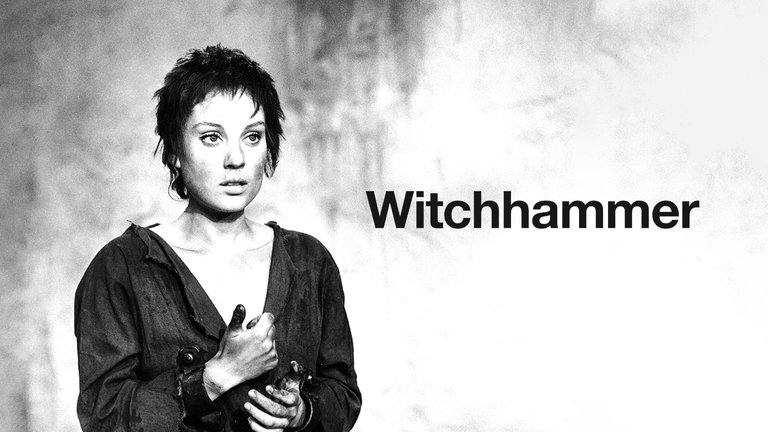
¿Cómo puede la gente matar en nombre de Dios?
In the Christian world, on November 1st, All Saints' Day is celebrated, and as is common in this religion, the eve is also an important date. All Hallow's Eve, abbreviated as Halloween, is a holiday of religious origin that nowadays has less to do with churches than with costumes, sweets, commerce and horror movies. Because of the latter, movie theaters usually show horror movies considered classics together with the latest releases of the genre, which are increasingly disappointing.
El 01 de Noviembre se celebra, en el mundo cristiano, la fiesta de Todos los Santos y como es común en este culto, la víspera también es una fecha importante. Al Hallow's Eve (Víspera de los Santos), abreviado como Halloween, es una fiesta de origen religioso que en la actualidad tiene menos que ver con iglesias que con disfraces, dulces, comercio y películas de terror. Debido a esto último las salas de cine suelen proyectar cintas de terror consideradas clásicas conjuntamente con los últimos estrenos del género, cada vez más decepcionante.
While I am not a fan of horror movies, I wanted to join the spirit of these days and although I had the chance to go see Halloween, the original with Jamie Lee Curtis (which by the way, I have never seen) or go see Terrifier 3, one of the new releases, I wanted to do something different and opted for a less conventional story for these dates, but - in my opinion - one that we should review and reflect on. Let's go back in time to the mid-17th century in Moravia (now the Czech Republic). As in other parts of Europe, ecclesiastical power was closely linked to the nobility and economic power at that time and although several centuries had passed since the establishment of the Inquisition (that court that punished crimes against faith), the infallibility of this legal arm of God was still in force, whose actions were mainly supported by one of the most infamous books ever written, the Malleus Maleficarum which went down in history as The Hammer of the Witches, because thanks to its existence thousands of women were condemned, tortured and murdered under charges of witchcraft, but what are witches but a fantastic invention of the human mind? Witches appear in Shakespeare's Macbeth, in the tales of Perrault and the Grimm brothers, in Disney movies, but that doesn't mean that they existed. In my opinion, what the "Holy" Inquisition did was helping shape and propagate the myth of witches by selling a lie - one more - to justify the unjustifiable.
Si bien no soy fanático de las películas de terror, quería unirme al espíritu de estos días y aunque tuve la posibilidad de ir a ver Halloween, la original con Jamie Lee Curtis (que por cierto, nunca he visto) o ir a ver Terrifier 3, uno de los estrenos, quise hacer algo diferente y opté por una historia menos convencional para estas fechas, pero - en mi opinión - una que deberíamos revisar y reflexionar sobre ella. Vayamos atrás en el tiempo hasta mediados del siglo XVII en Moravia (actualmente la República Checa). Como en otras partes de Europa, el poder eclesiástico estaba muy ligado a la nobleza y al poder económico en ese época y aunque ya habían pasado varios siglos desde la instauración de la Inquisición (ese tribunal que castigaba los delitos contra la fe) todavía estaba en vigencia la infalibilidad de este brazo jurídico de Dios cuyas acciones se amparaban principalmente en uno de los libros más infames jamás escritos, el Malleus Maleficarum que pasó a la historia como El Martillo de las Brujas, porque gracias a su existencia miles de mujeres fueron condenadas, torturadas y asesinadas bajo cargos de brujería, pero ¿qué son las brujas sino una invención fantástica de la mente humana? Las Brujas aparecen en Macbeth de Shakespeare, en los cuentos de Perrault y de los hermanos Grimm, en las películas de Disney, pero eso no significa que hayan existido. En mi opinión, lo que hizo la "Santa" Inquisición fue ayudar a configurar y propagar el mito de las brujas vendiendo una mentira - una más - para justificar lo injustificable.
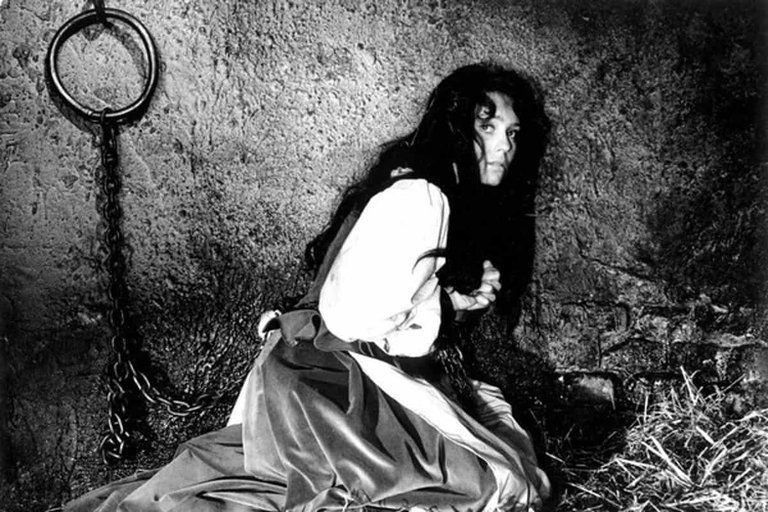
Who were witches then? They were usually healers, women who dedicated themselves to preparing and offering natural remedies, or who had some eccentric trait for the time, such as having a pet cat (even worse if it was black), living without a husband (for one reason or another), having a mole or mark on their body, or dedicating themselves to divination, and who were accused of worshipping the devil, copulating with him and despising Christian symbols, among many other crazy things.
¿Quiénes eran las brujas entonces? Normalmente curanderas, mujeres que se dedicaban a preparar y ofrecer remedios naturales, o que tenían algún rasgo excéntrico para la época como tener un gato de mascota (peor si era negro), vivir sin esposo (por alguna u otra razón), tener algún lunar o marca en el cuerpo, o dedicarse a la adivinación, y que eran acusadas de adorar al diablo, copular con él y despreciar los símbolos cristianos, entre muchas otras locuras.
Based on real texts about inquisitorial trials, the Czech film Kladivo na carodejnice (Witchhammer) shows some of the atrocities committed by the Inquisition on innocent people, mainly women, to force them to confess to things they had never done. By subjecting them to the most painful tortures (which in the film are not as graphic as they might be shown in today's cinema) they managed to subdue these women, mostly peasants, illiterate and very old, who, in order to avoid further pain, accepted the charges against them, but that did not save them from being burned at the stake. And I wonder: if they were going to be killed anyway, if confession did not save them from that atrocious fate, was it worth accepting those slanders? Why? It is a subject whose review seems interesting to me, as well as the fact that in the film many men are also condemned and that at that time, 1670 or so, several methods of the Inquisition were already considered obsolete and retrograde. The latter makes the film show dialogues or debates between members of the church, some in favor and others against, and although the bad guy of the film, the judge who carries out the trials of the heretics, is quite caricatured and is moved by very basic concrete personal interests (money, then) it doesn't stop generating frustration and impotence the way in which power can be used to trample on those who cannot defend themselves and to grant more and more power to those who already hold it.
Partiendo de textos reales sobre juicios inquisitorios, la película Checa Kladivo na carodejnice (Witchhammer) muestra algunas de las atrocidades cometidas por la Inquisición sobre personas inocentes, principalmente mujeres, para obligarles a confesar cosas que nunca habían hecho. Sometiéndolas a las torturas más dolorosas (que en la película no son tan gráficas como pudieran mostrarse en el cine de hoy en día) lograban doblegar a estas mujeres, en su mayoría campesinas, analfabetas y muy mayores, quienes para evitar más dolor aceptaban los cargos que se les imputaban sin que eso las salvase de morir en la hoguera. Y yo me pregunto: si de todas formas las iban a matar, si la confesión no las salvaba de ese atroz destino, ¿valía la pena aceptar esas calumnias? ¿por qué? Es un tema cuya revisión me parece interesante, así como el hecho de que en la película también condenan a muchos hombres y el que para esa época, 1670 más o menos, ya varios métodos de la Inquisición eran considerados obsoletos y retrógrados. Esto último hace que en la película se muestren diálogos o debates entre miembros de la iglesia, unos a favor y otros en contra, y aunque el malo de la cinta, el juez que lleva a cabo los juicios a los herejes, es bastante caricaturesco y se mueve por intereses personales concretos muy básicos (dinero, pues) no deja de generar frustración e impotencia la forma en que el poder puede servir para pisotear a aquellos que no pueden defenderse y para otorgarle cada vez más y más poder a quien ya lo detenta.
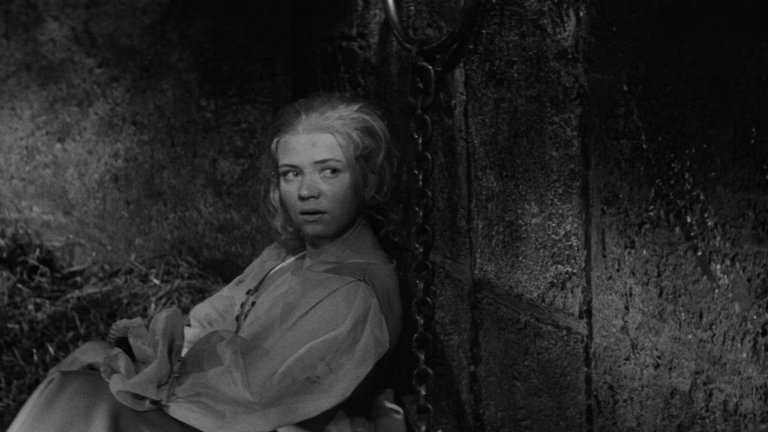
The latter made me think not only of the Inquisition but also of other tribunals that have condemned innocent people before even judging them, such as the procedures that have been carried out in dictatorial, communist and authoritarian regimes to eliminate their ideological opponents. I think of Stalin's Russia, Pinochet's Chile, even Nazi Germany, which was, at its core, nothing more than a witch hunt where Mein Kampf served as the Hammer of the Jews.
Esto último me hizo pensar no sólo en la Inquisición sino también en otros tribunales que han condenado a personas inocentes antes de tan siquiera juzgarlos, como los procedimientos que se han llevado a cabo en regímenes dictatoriales, comunistas y autoritarios para eliminar a sus opositores ideológicos. Pienso en la Rusia de Stalin, el Chile de Pinochet, incluso la Alemania nazi, en el fondo, no fue más que una cacería de brujas en donde Mein Kampf hizo las veces de Martillo de los Judíos.
Kladivo na carodejnice was directed by Otakar Vávra and co-written by him with Ester Krumbachová, based on the novel of the same name by Václav Kaplický, who took on the task of re-examining the trials held in Moravia at the end of the 17th century and the story of Boblig from Edelstat, the court judge who sentenced more than a hundred people under duress and torture. Most religions today, both in the East and the West, are patriarchies where the position of women is considered inferior, but I think that never in history, before or after (except perhaps in the current case of the Taliban regime that has radicalized its misogyny) has any church or power been so cruel towards women. In the film there are several very strong and clearly misogynistic phrases such as "A woman's vagina is the gateway to hell" or "The desire of a woman is the root of Evil" that seek to blame women when the responsibility should fall on others. If a man desires a woman, how is she to blame for that desire? Isn't it the man who should assume that emotion? Anyway, there is a lot to cut and a lot to talk about on this subject, but I wanted to talk about Witchhammer because on this Halloween Night there will be many stories in which you will see these creatures as villains, as terrible monsters lurking, but reviewing history a little, knowing who hunted them, satanized them and exterminated them, perhaps it would be good for us to ask ourselves, who is really the monster behind this story? Have any of you seen this movie? Have you heard of the Malleus Maleficarum? I read you in the comments.
Kladivo na carodejnice fue dirigida por Otakar Vávra y co escrita por él junto a Ester Krumbachová, basándose en la novela del mismo nombre de Václav Kaplický, quién se dio a la tarea de revisar los juicios llevados a cabo en Moravia a finales del siglo XVII y la historia de Boblig de Edelstat, el juez del tribunal que condenó a más de cien personas bajo coacción y tortura. La mayoría de las religiones actuales, tanto en Oriente como en Occidente, son patriarcados en donde la posición de la mujer es considerada inferior, pero creo que nunca en la historia, ni antes ni después (salvo quizás en el caso actual del régimen talibán que ha radicalizado su misoginia) ninguna iglesia o poder se ensañó tanto contra las mujeres. En la película hay varias frases muy fuertes y claramente misóginas como "La vagina de la mujer es la puerta del infierno" o "El deseo de la mujer es la raíz del Mal" que buscan culpabilizar a la mujer cuando la responsabilidad debería caer sobre otros. Si un hombre desea a una mujer ¿cómo es culpable ella de ese deseo? ¿no es acaso el hombre quien debe asumir esa emoción? En fin, hay mucha tela que cortar y mucho que conversar sobre ese tema, pero quise hablar de Witchhammer porque en esta Noche de Brujas serán muchas las historias en las que verán a estas criaturas como villanas, como terribles monstruos al acecho, pero revisando un poco la historia, sabiendo quién las cazó, las satanizó y las exterminó, quizás sería bueno que nos preguntásemos, ¿quién es verdaderamente el monstruo detrás de esta historia? ¿alguno de ustedes ha visto esta película? ¿habían oído hablar del Malleus Maleficarum? Los leo en los comentarios.
Reseñado por @cristiancaicedo
Other posts that may interest you | Otros posts que pueden interesarte:
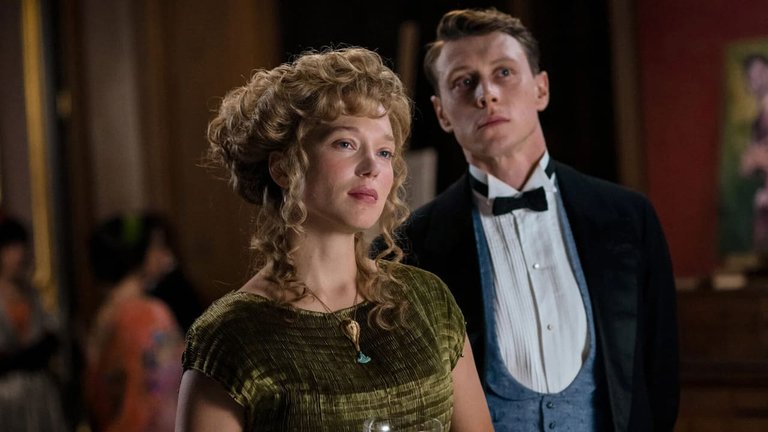   |
|---|
